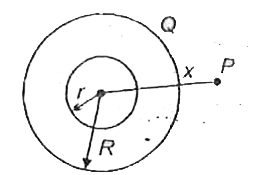Equal charges are given to two spheres of different radii. The potential will
be more one the smaller sphere
be more on the bigger sphere
be equal on both the spheres
depend on the nature of the materials of the spheres
The correct Answer is:A
To solve the problem, we need to analyze the relationship between charge, potential, and radius for two spheres with equal charges but different radii.
1. Understand the Formula for Electric Potential:
The electric potential V at the surface of a charged sphere is given by the formula:
V=KQR
where K is Coulomb's constant, Q is the charge on the sphere, and R is the radius of the sphere.
2. Identify the Given Information:
We have two spheres with equal charges Q but different radii R1 and R2. Let's assume R1<R2 (i.e., Sphere 1 is smaller than Sphere 2).
3. Calculate the Potential for Each Sphere:
- For Sphere 1 (smaller radius):
V1=KQR1
- For Sphere 2 (larger radius):
V2=KQR2
4. Compare the Potentials:
Since R1<R2, we can see that:
V1=KQR1>V2=KQR2
This indicates that the potential V1 of the smaller sphere is greater than the potential V2 of the larger sphere.
5. Conclusion:
Therefore, when equal charges are given to two spheres of different radii, the potential will be greater on the smaller sphere and less on the larger sphere.
Final Answer:
The potential will be greater on the smaller sphere and less on the larger sphere.
---
The electric potential V at the surface of a charged sphere is given by the formula:
V=KQR
where K is Coulomb's constant, Q is the charge on the sphere, and R is the radius of the sphere.
We have two spheres with equal charges Q but different radii R1 and R2. Let's assume R1<R2 (i.e., Sphere 1 is smaller than Sphere 2).
- For Sphere 1 (smaller radius):
V1=KQR1
- For Sphere 2 (larger radius):
V2=KQR2
Since R1<R2, we can see that:
V1=KQR1>V2=KQR2
This indicates that the potential V1 of the smaller sphere is greater than the potential V2 of the larger sphere.
Therefore, when equal charges are given to two spheres of different radii, the potential will be greater on the smaller sphere and less on the larger sphere.
The potential will be greater on the smaller sphere and less on the larger sphere.
Topper's Solved these Questions
- ELECTROSTATIC POTENTIAL AND CAPACITORSBOOK - DC PANDEY ENGLISHCHAPTER - ELECTROSTATIC POTENTIAL AND CAPACITORSEXERCISE - Check point 2.2
15 Videos
- ELECTROSTATIC POTENTIAL AND CAPACITORSBOOK - DC PANDEY ENGLISHCHAPTER - ELECTROSTATIC POTENTIAL AND CAPACITORSEXERCISE - Check point 2.3
15 Videos
- ELECTROSTATIC POTENTIAL AND CAPACITORSBOOK - DC PANDEY ENGLISHCHAPTER - ELECTROSTATIC POTENTIAL AND CAPACITORSEXERCISE - (C) Chapter exercises
50 Videos
- ELECTROMAGNETIC WAVESBOOK - DC PANDEY ENGLISHCHAPTER - ELECTROMAGNETIC WAVESEXERCISE - Sec C
22 Videos
- ELECTROSTATICSBOOK - DC PANDEY ENGLISHCHAPTER - ELECTROSTATICSEXERCISE - Medical entrances gallery
37 Videos
Similar Questions
Assertion: The surface charge densities of two spherical conductors of different radii are equal. Then the electric field intensities near their surface are also equal.
Reason: Surface charge density is equal to charge per unit area.
View SolutionTwo concentric hollow conducting spheres of radius r and R are shown. The charge on outer shell is Q. what charge should be given to inner sphere so that the potential at any point P outside the outer sphere is zero ?

View SolutionConcentric metallic hollow spheres of radii R and 4R hold charges Q1andQ2 respectively. Given that surface charge densities of the concentric spheres are equal, the potential difference V(R)−V(4R) is :
View SolutionA charge Q has been divided on two concentirc conducting spheres of radii R1andR2(R1>R2) such that the surface charge densities on both the sphere is same. Find the potential at their common center.
View Solution(A ): The surface densities of two spherical conductors of different radii are equal. Then the electric field intensities near their surface are also equal.
(R ): Surface density is equal to charge per unit area.
View SolutionEquipotential spheres are drawn round a point charge. As we move away from charge will the spacing between two spheres having a constant potential difference decrease, increase or remain constant.
View SolutionEquipotential spheres are drawn round a point charge. As we move away from charge will the spacing between two spheres having a constant potential difference decrease, increase or remain constant.
View SolutionThe radii of two metallic spheres are 5 cm and 10 cm and both carry equal charge of 75μC. If the two spheres are shorted then charge will be transferred-
View SolutionTwo conducting concentric, hollow spheres A and B have radii a and b respectively, with A inside B. Their common potentials is V. A is now given some charge such that its potential becomes zero. The potential of B will now be
View SolutionA number of spherical conductors of different radii are charged to same potential. The surface charge density of each conductor is related with its radius as
View Solution
